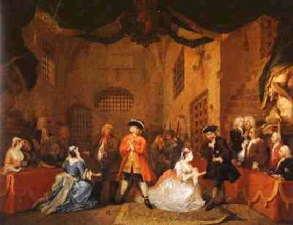Beg, Borrow, and Steal—History

The Beggar’s Opera
The Beggar’s Opera premiered
in London in 1728 and singing theatre hasn’t
been the same since!
John Gay created a new theatre genre,
the “ballad opera”, which used
popular tunes and told a story of the lower
classes rather than the aristocracy. This
was directly opposed to Italian opera, especially
the work of Handel, which dominated the
London stage at that time. Not only did
his comic farce poke fun at the prevailing
fashion in Italian opera by the upper classes,
it also took aim at the social and political
climate of the age—lampooning the
notable Whig statesman Robert Walpole and
the notorious criminals Jonathan Wild and
Jack Sheppard.
Gay’s songs—60 in total—are
based on songs known to working people of
London: popular broadsheet ballads, church
hymns, songs of the pubs and drinking dens,
folk tunes of the time plus a few he “lifted”
from Handel! What was most shocking to the
audience was the discrepancy between the
words and the music. Gay would take a sleazy
tune and place it with sweet and docile
lyrics. (A similar experience for us would
be if hymn lyrics were placed in a song
by Puff Daddy or Britney Spears.)
The show was a smash hit. It ran for 62
performances, setting the record for the
longest-ever theatre run, a record it held
for a hundred years!
Jonathan Swift
The Beggar’s Opera was
based on an idea of Jonathan Swift,
who proposed “ …what think
you, of a Newgate pastoral among the
thieves and whores there?”
William Hogarth
It was the the London of 1728. Teeming
with whores, highwaymen and ne’er
do wells, this world was depicted
in Hogarth’s first popular success
Scenes from The Beggar’s
Opera, and later in his later
famous series The Rake’s Progress.
John Gay brought this underworld
of London to life.
|
|

Hogarth’s Scenes from The Beggar’s
Opera |
|
|
|
|
|
|
A Rich Legacy
Not only has The Beggar’s
Opera had an influence on all later
British stage comedies, (especially the
comic operas of Gilbert and Sullivan), it
can be thought of as the ancestor of the
modern musical.
It was also the first example of political
satire and its overwhelming success encouraged
new writers such as Henry Fielding to begin
political drama works.
The Beggar’s Opera
has been constantly revived over the last
300 years and has inspired many composers
and arrangers of the 20th century to put
their own stamp on the piece:
- Kurt Weill and Bertold Brecht adapted
it into Die Dreigroschenoper (The Threepenny
Opera) which premiered in 1928.
- Benjamin Britten put his own twist
on the piece with his version for the
English Opera Group—first performed
in 1948 with Sir Peter Pears as MacHeath.
- Duke Ellington brought to Broadway
a jazz version called Beggar’s
Holiday which debuted in 1946.
- In 1975, Czech playwright (and future
president) Václav Havel created
a non-musical adaptation.
- The 1975 Broadway musical Chicago
has a plot with very similar satiric intent.
- Richard Bonynge created a new arrangement
for Australian Opera which ran in the
1980s.
- The all-female Japanese troupe Takarazuka
Revue produced a play in 1998 based
on The Beggar’s Opera
titled Speakeasy. The play was Maya Miki’s
retirement play.
|